Suchergebnisse
# Murau : Real-World Laboratory of energy transition for inner-alpine regions
Inner-alpine regions are rich in the natural resources water, sun, wind and biomass. This study investigated how the Murau region can become a stable and fail-safe, renewable 100% region and how it is possible to supply the energy-hungry conurbations as a needs-based energy export region.
REal - The laboratory for Integrated Regional Renewable Energy Systems
In the REal project, a holistic, scalable and user-friendly concept was created, whereby sector-coupled, municipal energy systems with 100% renewable energy can be implemented, considering all necessary aspects from planning to operation, reducing design costs and accelerating an Austria-wide implementation.
MURREAL: Murtaler Reallabor - On the way to 100% renewable energy by 2040
MURREAL connects the actors of the industrial region Murtal with specialists in the field of high tech and materials with the raw material and energy sector, service providers and research and development. In this exploration for a real laboratory, synergies had been worked out and business models had been built up to consistently take the path towards 100% renewable energy and climate neutrality by 2040.
SmartControl - Standardisierte und smarte Steuerung von kommunalen Energiesystemen
Das Ziel ist die Entwicklung eines standardisierten und einfach implementierbaren Verfahrens für die Kommunikation, Überwachung und Steuerung von dezentralen Technologien innerhalb von kommunalen Energiegemeinschaften. Dazu werden innovative Schnittstellen und selbstlernende Algorithmen entwickelt, welche sicherstellen, dass das Konzept auf Kommunen bzw. Quartiere - ohne großen Daten- und Messaufwand - übertragen werden kann.
Standardisierte und smarte Steuerung von kommunalen Energiesystemen (SmartControl)
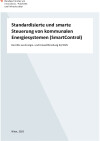
Das Ziel ist die Entwicklung eines standardisierten und einfach implementierbaren Verfahrens für die Kommunikation, Überwachung und Steuerung von dezentralen Technologien innerhalb von kommunalen Energiegemeinschaften. Dazu werden innovative Schnittstellen und selbstlernende Algorithmen entwickelt, welche sicherstellen, dass das Konzept auf Kommunen bzw. Quartiere - ohne großen Daten- und Messaufwand - übertragen werden kann.
Schriftenreihe
82/2025
Stefan Aigenbauer, Pascal Liedtke, Christine Mair, Bernhard Wüster
Herausgeber: BMIMI
Deutsch, 47 Seiten
Downloads zur Publikation
LOW TECH innovation-lab - Reallabor für die Transformation zu klima- und ressourcenschonenden Energieregionen mit innovativen LOW TECH Lösungen
LOW TECH innovation-lab setzt sich den Aufbau eines Innovationslabors zum Ziel, in welchem auf Basis eines optimierten Ansatzes hinsichtlich Technikeinsatz einerseits und Potenzialen der Kreislaufwirtschaft, lokaler Umweltressourcen und sozialer Innovationen andererseits innovative Modellösungen entwickelt, erprobt und in Kooperation mit geeigneten Pilotregionen breit ausgerollt werden.
LOW TECH innovation-lab - real laboratory for the transformation to climate and resource-saving energy regions with innovative LOW TECH solutions
LOW TECH innovation-lab aims to set up an innovation laboratory in which innovative model solutions are developed, tested and widely rolled out in cooperation with suitable pilot regions on the basis of an optimized approach with regard to the use of technology on the one hand and the potential of the circular economy, local environmental resources and social innovations on the other.
LOW TECH innovation-lab: Reallabor für die Transformation zu klima- und ressourcenschonenden Energieregionen mit innovativen LOW TECH Lösungen
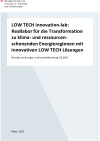
LOW TECH innovation-lab setzt sich den Aufbau eines Innovationslabors zum Ziel, in welchem auf Basis eines optimierten Ansatzes hinsichtlich Technikeinsatz einerseits und Potenzialen der Kreislaufwirtschaft, lokaler Umweltressourcen und sozialer Innovationen andererseits innovative Modellösungen entwickelt, erprobt und in Kooperation mit geeigneten Pilotregionen breit ausgerollt werden.
Schriftenreihe
76/2025
Edeltraud Haselsteiner, Sarah Teresa Fuchs, Thomas Zelger, David Sengl, Edit Paráda, Simon Schneider, Jasmin Helnwein, Natalie Taupe, Bernhard Lipp, Ute Muñoz-Czerny, Maria Wirth, Ines Kantauer, Harald Frey, Lisa Gallian, Martin Holper
Herausgeber: BMIMI
Deutsch, 95 Seiten
Downloads zur Publikation
Bewertung der Bauteilaktivierung als Option für Flexibilität im Strommarkt
Um die Forschungsfrage dieser Studie nach dem zukünftigen Stellenwert der Bauteilaktivierung für die Energieversorgung zu beantworten, wurde ein Schätzmodell zum erwartbaren Neubau von Wohn- und Dienstleistungsbauten bis 2040 sowie der Sanierung von Bestandsbauten entwickelt.
TANZ – Sondierung Reallabor. Tourismus als Chance für die Energiewende im Pinzgau
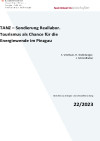
Sondierung für ein regionales Reallabor zur Beschleunigung der Klimaneutralität Österreichs 2040 in der Tourismusregion Pinzgau. Basierend auf zahlreichen Vorarbeiten wurden Realtests für die Innovationsfelder Sektorkopplung, Energiegemeinschaften und Nachhaltige Wärmelösungen konzipiert, die Organisationsstruktur des Reallabors erarbeitet und relevante Akteur:innen aktiv eingebunden.
Schriftenreihe
22/2023
S. Vitzthum, R. Stollnberger, J. Schmidhuber
Herausgeber: BMK
Deutsch, 59 Seiten
Downloads zur Publikation
REGOreal - 100% Renewable Energy Region: Local Energy Common Good Economy in real laboratories for networked energy and mobility cells
In REGOreal, the exploration for a 100% renewable energy region in the area of Retz-Horn-Krems-Tulln (Lower Austria) and Mallnitz (Ktn) is taking place. There are four focus topics: 100 Renewable Energy Communities (REC), 1.000 building renovations, 10.000 energy exporters (in the sense of employees who carry the approach into their private environment) and 100 Mio. km of sustainable mobility with extensive use of IT for the development of local integrated energy systems (IES) to integrate a colorful mix of different actors and objects.
Sondierung für ein Reallabor im zentralen Inntal für klimaneutrale semiurbane Gebiete (INNERGY)
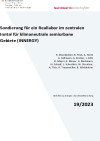
Die Potentiale von Bestandsquartieren und Industriebetrieben für eine nachhaltige Energieversorgung wurden in einem kleinstrukturierten Gebiet ganzheitlich und sektorenübergreifend erhoben und konkrete Umsetzungsprojekte für eine klimaneutrale Region ausgearbeitet.
Schriftenreihe
19/2023
R. Ebenbichler, B. Frick, A. Hertl, A. Hofmann, A. Kratzer, L. Köll, D. Meyer, K. Meyer, A. Riedmann, N. Schaaf, L. Schuchter, W. Streicher, A. Thür, R. Traunmüller, B. Winklehner
Herausgeber: BMK
Deutsch, 22 Seiten
Downloads zur Publikation
CITYGovernance: Übergeordnete klimaneutrale Governance für Städte
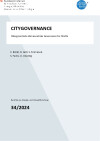
Ziel der F&E Dienstleistung war, Erkenntnisse über Hemmnisse und Hindernisse der übergeordneten Governance für die Zielerreichung “Klimaneutralität von österreichischen Städten” zu erlangen, zu strukturieren und in einer publizierbaren Studie aufzubereiten. Die Studie konzentriert sich dabei auf die Bereiche Energie, Gebäude und Mobilität und enthält Handlungsempfehlungen zu notwendigen Rahmenbedingungen und Änderungsbedarfen.
Schriftenreihe
34/2024
C. Böckl, H. Grill, S. Formanek, S. Fuchs, U. Unzeitig
Herausgeber: BMK
Deutsch, 140 Seiten
Downloads zur Publikation
KLIMUR – Klimaresilientes urbanes Ressourcenmanagement am Fallbeispiel Zukunftshof und Rothneusiedl
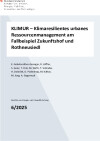
Für das Konzept des Zukunftshofs, einer innovativen urbanen Landwirtschaft, sollen durch Optimierungstools und parametrischem Design Entwicklungsszenarien für ein integriertes Energie- und Ressourcenkreislaufsystem entwickelt werden. Eine Roadmap, bestehend aus technischen Konzepten und einer abgestimmten Finanzierungsstrategie, soll die Grundlagen für ein Demoprojekt liefern, das in der Praxis zeigt, wie der Zukunftshof Ausgangspunkt und Basis für eine ressourceneffiziente und klimaresiliente Stadtentwicklung sein kann.
Schriftenreihe
6/2025
E. Gebetsroither-Geringer, R. Löffler, S. Geier, T. Fink, M. Wirth, T. Vobruba, H. Dolinšek, D. Podmirseg, M. Kaftan, M. Jung, A. Gugumuck
Herausgeber: BMK
Deutsch, 46 Seiten
Downloads zur Publikation
Stadtquartiere mit optimierten solar-hybriden Heiz- und Kühlsystemen (CiQuSo)
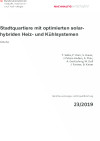
Das Forschungsansuchen untersucht, evaluiert und optimiert effiziente Systemlösungen zur solaren Energieversorgung auf Gebäude- und Stadtquartiersebene. Die Anwendbarkeit der entwickelten Konzepte wird am Beispiel des Salzburger Stadtquartiers Itzling demonstriert.
Schriftenreihe
23/2019
T. Selke, P. Horn, S. Hauer, J. Peters-Anders, A. Thür, A. Goritschnig, W. Doll J. Furtner, B. Kaiser
Herausgeber: BMVIT
Deutsch, 81 Seiten
Downloads zur Publikation
Leitfaden für nachhaltige Energieversorgungskonzepte für Quartiere
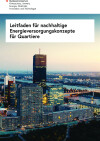
In diesem Leitfaden werden Wärmepumpentechnologien, Solarthermie, Biomasse, Kraft-Wärme-Kopplungen, Fern- sowie Nahwärme und Brennstoffzellen als künftige nachhaltige zentrale bzw. dezentrale Energieversorgungssysteme in Quartieren betrachtet und hinsichtlich ihrer Eignung bewertet.
G. Weber, M. Banozic, B. Fina, D. Horak, G. Zucker
Herausgeber: BMK
Deutsch, 76 Seiten
Downloads zur Publikation
TANZ - Sondierung Reallabor: Tourismus als Chance für die Energiewende im Pinzgau
Sondierung für ein regionales Reallabor zur Beschleunigung der Klimaneutralität Österreichs 2040 in der Tourismusregion Pinzgau. Basierend auf zahlreichen Vorarbeiten wurden Realtests für die Innovationsfelder Sektorkopplung, Energiegemeinschaften und Nachhaltige Wärmelösungen konzipiert, die Organisationsstruktur des Reallabors erarbeitet und relevante Akteur:innen aktiv eingebunden.
TANZ - Exploration of a regional living lab: Tourism as an opportunity for the energy transition in Pinzgau
Exploration for a regional living lab to accelerate Austria's climate neutrality in 2040 in the tourism region of Pinzgau. Based on numerous preliminary works, model solutions (“Realtests”) for the innovation fields of sector coupling, energy communities and sustainable heating solutions were designed, the organisational structure of the living lab is developed and stakeholders were actively involved.
EnErGie Werk Weiz - Erneuerbare-Energie-Gemeinschaft Gewerbepark Energiestraße und Werksweg Weiz
Aufbauend auf den Ergebnissen des Sondierungsprojekts REC-Businesspark, soll in Weiz ein Demonstrator für einen „Erneuerbaren-Energie-Gemeinschaft-Gewerbepark“ entstehen. Der Fokus liegt auf der Entwicklung innovativer Betriebs- und Tarifmodelle eines Redox-Flow-Speichers, welcher in eine Erneuerbare-Energie-Gemeinschaft eingebunden ist.
EnErGy Plant Weiz - Renewable energy community Business Park Energy Lane and Factory Lane Weiz
Based on the results of the exploratory study project REC-Businesspark, a demonstrator for a "renewable energy community business park" is to be developed in Weiz. The focus is on the development of innovative operating and tariff models for a redox flow storage system that is integrated into a renewable energy community.
